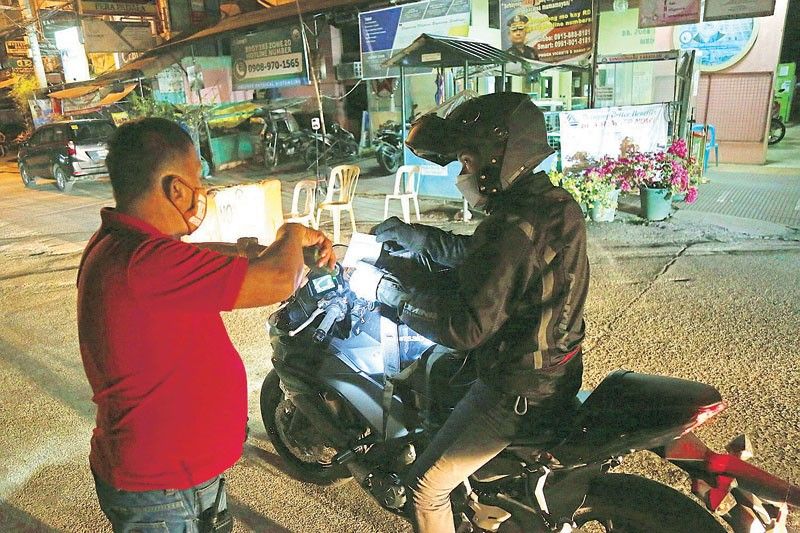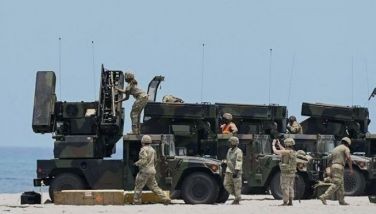Government tightens enforcement of health protocols

MANILA, Philippines — The government is tightening the enforcement of health protocols to arrest a resurgence of COVID-19 infections, including those caused by the more contagious South African and Brazilian variants, Malacañang said yesterday.
“We really have to be stricter when it comes to the law enforcement side,” Cabinet Secretary Karlo Nograles told radio station dzBB in Filipino, as he explained the need for the police, local governments and the Metropolitan Manila Development Authority (MMDA) to step up efforts to contain the virus.
With the COVID-19 caseload well over 591,000, the country recorded 3,439 new infections last Saturday – the biggest one-day tally of new cases in five months, the Department of Health (DOH) said.
“We can see that the PNP (Philippine National Police) is stricter in implementing and enforcing protocols. They are really accosting (violators),” said Nograles.
“We’re also looking to the MMDA in terms of enforcement here in Metro Manila. There is a need really to accost and remind people who are not following (protocols) and those who are stubborn. They know what to do,” he added.
Nograles, who co-chairs the task force combating the pandemic, said mayors and governors have the authority to impose measures that would stem the increase of infections in their respective areas.
While some sectors attributed the spike in COVID-19 cases to the easing up of community quarantines in order to reopen the economy, the Cabinet secretary said local governments may impose granular lockdowns in areas with alarming rates of infection.
“The local government units (LGUs) are there, they are on the ground and they can provide a quick assessment and action. It is within their power to make adjustments, policies, or decisions,” he said.
Nograles said the situation in areas of concern like Pasay City would be considered when the government decides on the quarantine classifications for April.
“We are monitoring the spike in infections in Pasay City and other areas in Metro Manila. We have to do the genome sequencing especially in Metro Manila so we can detect the variants we are monitoring like the South African and UK variant,” he said.
“We will monitor the cases for the entire month of March and obviously, it would be our basis for making recommendations for April,” he said.
Nograles reminded the public that while the new COVID-19 variants are more contagious, the manner of transmission is the same; so everyone should continue to wash their hands frequently, wear face masks and observe physical distancing.
Earlier, President Duterte said he would loosen pandemic-related restrictions nationwide if the government maintains a stockpile of at least two million vaccine doses.
But yesterday, Nograles clarified: “While the vaccines have arrived, it does not mean we can stop complying with the health protocols.”
In a related development, the Presidential Security Group (PSG) is implementing stricter measures to secure the Chief Executive from health risks, especially since he has not yet been inoculated against COVID-19.
Nograles said that while the 75-year-old Duterte has been very visible to the public recently, the PSG has been limiting the number of people who can approach him.
“We can see that they (PSG) are very strict. They screen the people who can go near (the President),” he said.
‘Enforcers exhausted’
The challenge to law enforcers, though, to sustain the drive against health protocol violators is starting to be “exhausting,” according to the officer-in-charge of the Department of the Interior and Local Government (DILG).
“On March 16, we’re marking our first year. March 16 last year was when the lockdown in Luzon was declared. It’s like people are already exhausted, including the law enforcers,” DILG Undersecretary Bernardo Florece told dzBB in Filipino.
On this pretext, Florece said LGUs should impose and enhance their respective ordinances with corresponding penalties for violation of health protocols.
“If LGUs have existing ordinance, they should enhance it. Some have ordinances, but no penalties on violators,” he said.
He said the DILG is set to release a new memorandum circular that standardizes ordinances for cities and municipalities for health protocol violations in a bid to curb the rising trend in new COVID-19 cases.
Also, the DILG would issue an advisory on more lenient protocols for local travel so as to clarify the new guideline given by the Inter-Agency Task Force for the Management of Emerging Infectious Diseases (IATF).
DTI steps up monitoring
The Department of Trade and Industry (DTI) said it would contribute to the effort to arrest the rise in infections by stepping up its campaign for strict compliance to health protocols by business establishments.
“[We] will also increase further workplace monitoring and enforcement,” Trade Secretary Ramon Lopez said in a Viber message to reporters.
He acknowledged the need for better compliance to health protocols in communities and public markets and boost contact tracing and testing efforts.
But the DTI maintained its position against the implementation of a wide-scale lockdown because the economy needs to recover.
Lopez said there is no need to withdraw the recent go-signal given to reopen some sectors. “It’s not due to the newly opened sectors because we haven’t implemented yet,” he said.
Instead, the DTI chief pointed out that citizens could do better in avoiding private gatherings in their homes to lessen the risk of transmitting the virus. “Feedback from the ground, new cases coming mostly from household,” he said.
The DTI recently issued Memorandum Circular 21-08 which recategorized sectors to Category III from Category IV and allow reopening in areas under general community quarantine (GCQ).
Under the MC which took effect last Friday, cinemas are allowed to operate at a maximum of 25 percent capacity in GCQ areas and 50 percent in those under modified GCQ (MGCQ), but would have to comply with health and safety protocols and additional guidelines from the DOH and
LGUs.
Mall operators however, deferred the reopening of cinemas, opting to wait for guidelines from LGUs.
Apart from traditional cinemas, the MC also covered driving schools; video and interactive game arcades; libraries, archives, museums, and cultural centers; tourist attractions like parks, theme parks, natural sites and historical landmarks; and meetings, incentives, conferences, exhibitions.
Areas under GCQ for this month are Metro Manila, Apayao, Baguio City, Kalinga, Mountain Province, Batangas, Tacloban City, Iligan City, Davao City and Lanao del Sur.
The rest of the country is under the more relaxed modified GCQ. – Romina Cabrera, Louella Desiderio
- Latest
- Trending





























